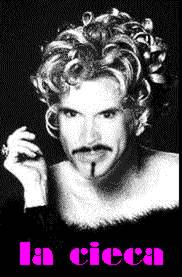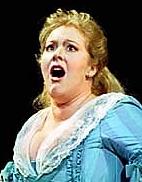 Seventy-five
years ago, Maria Callas was born right here in New York City. Five
years ago, a sad mad queen desperate for something
to fill his non-artistic days pasted together a one-page flyer to celebrate
the 70th birthday of the greatest of all divas. And now this 34th issue
of parterre box celebrates two anniversaries:
Maria's diamond jubilee and the zine's fifth birthday. Seventy-five
years ago, Maria Callas was born right here in New York City. Five
years ago, a sad mad queen desperate for something
to fill his non-artistic days pasted together a one-page flyer to celebrate
the 70th birthday of the greatest of all divas. And now this 34th issue
of parterre box celebrates two anniversaries:
Maria's diamond jubilee and the zine's fifth birthday.
No love lost between Cecilia Bartoli and Jonathon Miller: a person with ties to the [Nozze di Figaro] production, who spoke on the condition of anonymity" bitched to the New York Times that Bartoli was late for rehearsals and that martinet Miller "refused at first" to stage the two now-notorious "alternate" arias interpolated for Bartoli. (La Cieca has this delightful image of Dr. Miller suddenly stopping the rehearsal and asking, "Dreadfully sorry, my dear, but would you mind terribly telling me what the bloody hell you're singing?") The article went on to assert that Bartoli demanded that her contract guarantee her the right to sing these arias. Then followed a lot of aesthetic argument about the inappropriateness of the "Al desio," a judgement with which La Cieca concurs, but that's rather beside the point. What is to the point is the Times' retraction of this piece the very following day, a testament to the efficiency of Francois Giuliani's Met press office. The official story is that Bartoli, Levine and Joe Volpe came to a mutual decision to make this musical change, though nobody seems to mention when (or if) Miller was consulted. More excitement ensued at the performance of 11 November when booing was heard during Bartoli's solo curtain call; the second time she came forward she was joined by Bryn Terfel as the Met's ushers rushed down the aisles to check the names and email addresses of the troublemakers. The Met is just protecting their investment in Bartoli, who in the next few seasons is slated to grace new productions of La sonnambula, La Perichole and L'Heure Espagnole, as well as a revival of Pélléas et Mélisande, during which the diminuitive diva is expected to interpolate "L'année chasse l'année en vain" into the grotto scene. I think we may all take it as a given that this revival will be staged by an assistant, not the original producer.
Who would believe it? At long last, La Cieca has
come to understand what the Flappers see in Renee Fleming: her
Contessa in the Met�s mixed-bag new Figaro utterly surprised
me with some very lovely singing in "Porgi amor," supported well, quite
firmly in tune, and with an elegant sense of line. "Dove sono" started
just as promisingly, but fell apart on the absurdly slow, impossibly
pianissimo reprise � but that�s mostly James Levine�s self-indulgent
fault. Mozart brings out the best in this soprano, who, when she eschews
all that mannered nonsense, is a charming presence in voice and movement,
graceful and elegant. A real opera producer (that is, not Jonathan
Miller) could help her realize more dramatic nuance and find a way
to keep her from losing focus in sustained scenes. In the meantime,
Fleming�s face and figure are every bit as glamorous as her voice, despite
dowdy costumes and a mousy russet wig. More to La Cieca�s taste was
the white sequined Auntie Mame drag Fleming slipped into for
"Contessa perdono," very MGM.  La
Cieca's long-lost twin brother Dr. Repertoire (who knows everything about
opera) is back and he's gone online. Now, on his very own webpage, the
good doctor answers your questions and offers his own uniquely arrogant
opinions on, well, everything. To access parterre box's own pundit,
click on Montsi (and dig those catglasses!) La
Cieca's long-lost twin brother Dr. Repertoire (who knows everything about
opera) is back and he's gone online. Now, on his very own webpage, the
good doctor answers your questions and offers his own uniquely arrogant
opinions on, well, everything. To access parterre box's own pundit,
click on Montsi (and dig those catglasses!)
What opera company's music director has been waving his baton in the wrong venue lately -- specifically, getting his big thick thing serviced in a notorious sex club? Sure, this town's known for it's wide-open gay life, but the rule around the opera house is "don't shit where you eat" -- as a former official with this company found out to his sorrow. Bigger news even that Newt Gingrich�s resignation is Fleming decision not sing her first Violetta this fall at the Met after all. General Manager Joseph Volpe announced last week that the soprano has withdrawn for "personal reasons." Ms. Fleming has in the past year separated from her husband, humpy actor Rick Ross, and has taken on an intense (some would say insane) schedule of new roles and new productions, including creating the role of Blanche in Andre Previn's Streetcar Named Desire, a disastrous Lucrezia Borgia at La Scala, and of course Figaro just last week. (La Cieca cannot imagine it is much fun to sing "Dove sono" while you�re suffering a fresh case of the Reno jumpy-wumps.) Patricia Racette, first scheduled to introduce this role to New York next season, then to go into second cast behind Ms. Fleming, now moves up to opening night � much to the annoyance of producer Franco Zeffirelli, who wanted to offer the role to an attractive protégée of his (a girl, I mean). So, here's the death toll on this unlucky Traviata: Soprano and tenor stars Angela Gheorghiu and Roberto Alagna: contracts withdrawn by Volpe Conductor Simone Young: dumped and hastily replaced by James Levine Unidentified director/designer team who �made Paris look like Vienna�: replaced by the Zef (who makes Beijing look like Hunan Garden) Jane Shaulis: still singing Annina Coming soon (well, maybe
"soon" isn't exactly the right word!) from Opera News: the all-barihunk
issue. Here's a preview!
What former New York City Opera bigwig has abandoned
the lyric muse for a rather more hazardous profession -- that of pimp
to some of the city's highest-paid callboys? (Juicy details on this
story courtesy of Billy Masters from Filth.)
"The only authentic Tosca I have heard in this theater in ten years -- no, fifteen. Certainly not since Caballe," raved a certain internationally-known artists' manager after the second act of Aprile Millos's first Met performance of Puccini's Roman diva. And (unusually in La Cieca�s experience), the third act of the opera did not seem an anticlimax: the soprano just got better and better until she brought the curtain down with a world-class high B-flat and a truly terrifying leap into the void. There are still a few rough edges dramatically where she could use the advice of a good director, and certainly she and Nello Santi need to come to some sort of truce on the "follow my rubato" issue, but she is just so damned apt for this part: feminine, girlish, a little silly, romantic, vulnerable � a girl from the country with an incredible gift and a huge capacity for feeling. Millo is a bit of a ditz, really, sneaking glances at Mario while she prays to the Virgin, pouting shamelessly about the Magdalene's blue eyes, and vamping Mario like an Empire Bette Midler. This quality of simplicity carries over into the second act: Tosca is so far out of her league here that murder is her only possible way out. Millo has found a connection to her body I have never seen in her before, a real sense of flowing motion that exactly parallels the liquid legato of her voice. No one, not even Borodina, sings like this today (though Borodina's voice is perhaps just a little smoother than Millo's): the freedom of rubato, the infinitely varied portamenti, the brilliant ringing quality of the top notes (very nearly always perfectly in tune). The middle voice is rich in color without heaviness. The words float on the tone and carry throughout the house. And the Italian! Oh, it's just mouthwateringly elegant! Now, it is true that La Millo has gained a kilo or two since the '80s, and she is not flattered by the Met's thrown- together costumes. Ms. Millo is not tall, and she is quite bountifully endowed in the poitrine. Why, then, would any costumer in his right mind encrust her entire bodice in paillettes and rhinestones? Yes, I know it's the same design Hildegard Behrens wore when this production was new, but, hey, Behrens needs tarting up to look like a star. Millo's got the diva thing down, way down. Manon Lescaut, anyone? Adriana Lecouvreur? And here's even more gossip from La Cieca! |

 La
Cieca was delighted to witness the concert debut on October 17 of actress
Christine Baranski, who soloed with the New York Pops under the
able baton of maestro Skitch Henderson. A packed Carnegie Hall
cheered the diva as she performed a demanding program of classical numbers
and show tunes, including an atmospheric "Beau soir" and an elegantly
playful Séguidille from Carmen. La Baranski returned for the
second half in a drop-dead ensemble of black velvet strapless sheath
with sequined flounce and matching long black gloves, bearing a startling
resemblance to the Tattinger Champagne lady. In a vibrant, slightly
husky contralto, she vamped her way through a set of jazzy Gershwin
arrangements, including a rousing "I got rhythm." Baranski explained
that this song (and the dress, by the way) were originally intended
for a Gershwin tribute a couple of years ago, but she had to cancel
because of scheduling conflicts with her Cybill television show.
La Cieca must say that both vocally and visually Ms. Baranski was worth
the wait, just the thing for symphony concerts and -- just possibly
-- opera. Yes, opera! You see, backstage, the actress confided to La
Cieca that she dreams of singing Prince Orlovsky in Fledermaus.
She is also in demand for both television (her own series) and Broadway
(a major revival of a classic American musical).
La
Cieca was delighted to witness the concert debut on October 17 of actress
Christine Baranski, who soloed with the New York Pops under the
able baton of maestro Skitch Henderson. A packed Carnegie Hall
cheered the diva as she performed a demanding program of classical numbers
and show tunes, including an atmospheric "Beau soir" and an elegantly
playful Séguidille from Carmen. La Baranski returned for the
second half in a drop-dead ensemble of black velvet strapless sheath
with sequined flounce and matching long black gloves, bearing a startling
resemblance to the Tattinger Champagne lady. In a vibrant, slightly
husky contralto, she vamped her way through a set of jazzy Gershwin
arrangements, including a rousing "I got rhythm." Baranski explained
that this song (and the dress, by the way) were originally intended
for a Gershwin tribute a couple of years ago, but she had to cancel
because of scheduling conflicts with her Cybill television show.
La Cieca must say that both vocally and visually Ms. Baranski was worth
the wait, just the thing for symphony concerts and -- just possibly
-- opera. Yes, opera! You see, backstage, the actress confided to La
Cieca that she dreams of singing Prince Orlovsky in Fledermaus.
She is also in demand for both television (her own series) and Broadway
(a major revival of a classic American musical).
 Tempestuous
divette Ruth Ann Swenson cancelled on very short notice a concert
performance of Thomas' Hamlet for the Washington Concert Opera,
which, frankly happens now and then. But what usually doesn't happen
is that the company receives an anonymous tip that the indisposed artiste
was booked for a recording session in Europe on the same date! After
engaging Annick Massis to substitute for the zaftig truant, WCO
General Director Stephen Crout fired off a press release announcing
he would "instigate an arbitration" with AGMA over La Swenson's broken
contract.
Tempestuous
divette Ruth Ann Swenson cancelled on very short notice a concert
performance of Thomas' Hamlet for the Washington Concert Opera,
which, frankly happens now and then. But what usually doesn't happen
is that the company receives an anonymous tip that the indisposed artiste
was booked for a recording session in Europe on the same date! After
engaging Annick Massis to substitute for the zaftig truant, WCO
General Director Stephen Crout fired off a press release announcing
he would "instigate an arbitration" with AGMA over La Swenson's broken
contract.